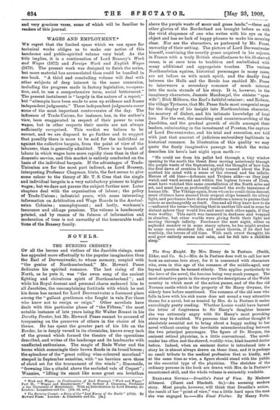NOVELS.
THE BURNING CRESSETA'
Os' all the heroes and victims of the Jacobite risings, none has appealed more effectually to the popular imagination than the Earl of Derwentwater, to whose memory, coupled with "the genius of Northumberland," Mr. Howard Pease dedicates his spirited romance. The last rising of the North, as he puts it, was "the swan song of the ancient fighting and chivalrous spirit of Northumberland"; and while his Royal descent and personal charm endeared him to all Jacobites, the uncomplaining fortitude with which he met his doom has earned for Lord Derwentwater a foremost place among the " gallant gentlemen who fought in vain For those who knew not to resign or reign." Other novelists have dealt with this particular phase of "the Fifteen," the most notable instance of late years being Sir Walter Besant in his Dorothy Forster, but Mr. Howard Pease cannot be accused of trespassing on the preserves of others in the choice of his theme. He has spent the greater part of his life on the Border, he is deeply versed in its chronicles, knows every inch of the ground which formed the theatre of the operations described, and writes of the landscape and its landmarks with unaffected enthusiasm. The magic of Rede Water and the burns which commingle their brown floods in its broad bosom; the splendour of the " great rolling wine-coloured moorland " Steeped in September sunshine, with " no barriers save those of cloud set for the tournament of the winds" ; Simonside, "frowning like a citadel above the secluded vale of Coquet" ; Wannies, " lifting its snout like some great sea leviathan • Work and Wages: in Continuation of Lord Brassey's "Work and Wages." Part IL, "Wages and Employment." By Sydney J. Chapman, Professor n the University of Manchester. With an Introduction by Lord Brassey, Sr,c. London : Longman and Co. [10s. 6d. net.] + The Burning Cresset : a Story of the "Last Along of the North" (1716). By lIo*ard Pease. London : A. Constable and Co. [6s.]
above the purple waste of moor and grass lands,"—these and other glories of the Borderland are brought before us with the vivid eloquence of one who writes with his eye on the object and has no lack of happy phrases to make his meaning clear. Nor are the characters, as portrayed by Mr. Pease. unworthy of their setting. The picture of Lord Derwentwater
himself, combining the courtly grace acquired in his sojourn in France with a truly British steadfastness to his ill-starred cause, is at once true to tradition and embellished with many additional and appropriate touches. The various Northumbrian squires, historical personages in many eases, are set before us with much spirit, and the deadly feud
between the Halls and the Reeds has enabled Mr. Pease to interweave a secondary romance of much interest into the main strands of his story. It is however, in the imaginary characters, Jeannie Macdougal, the sinister "spas.
wife"; Dick Milburn, the Earl's faithful retainer; and Robson, the village Tyrtaeus, that Mr. Pease finds most congenial scope for the display of his insight into Northumbrian character, his mastery of dialect, and his intimate knowledge of local lore. For the rest, the marching and countermarching of the Jacobites, and the gradual growth of strife amongst their leaders, culminating in the investment of Preston, the capture of Lord Derwentwater, and his trial and execution, are told with just that amount of judicious embroidery legitimate in historical romance. In illustration of this quality we may quote the finely imaginative passage in which the writer describes his hero's last night upon earth :—
" He could see from his pallet bed through a tiny window opening to the north the Great Bear moving noiselessly through the purple waste of the Septentrion, and the thought of how from the first dawn of creation it had nightly roamed about the Pole soothed his mind with a sense of the eternal and the infinite. Heroes of old time—Achteans and Trojans alike—as they kept watch and ward around and within the topless towers of Ilium, must have watched this same constellation of the North arise and set, and must have as profoundly realized the swife transience of human life. The Vikings again, from whom he could claim descent, must of ttimes have steered their serpent ships beneath its silvery light, and perchance have drawn therefrom a lesson to pursue their course as unchangeably as itself. One and all they knew how to die —unfeared the issue—believing that in another life and in some far distant sphere they would live and meet each other again, if they were worthy. This earth was immured in darkness and wrapped in slumber, but other worlds were giving forth their light and moving through infinity. Perchance the next night, either on asphodel meadow or in some starry sphere, he too might awaken to some more abundant life, and meet therein, if he died but worthily, the heroes of old time. With such sweet thoughts his soul grew entirely serene and calm, and he fell into a childlike sleep."






































 Previous page
Previous page